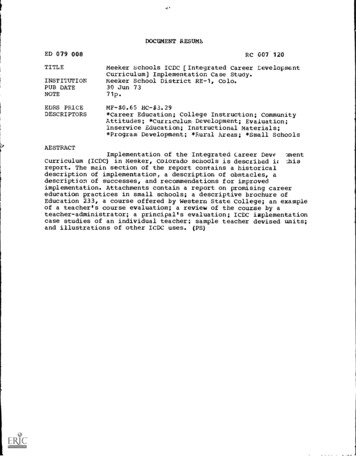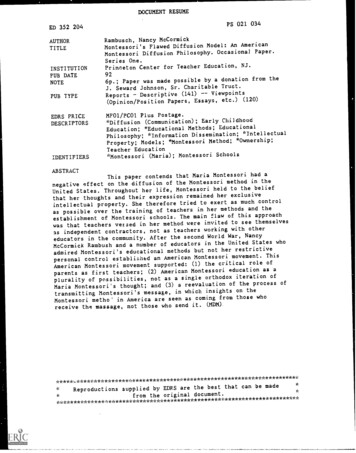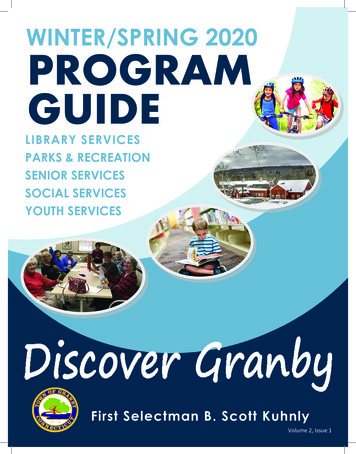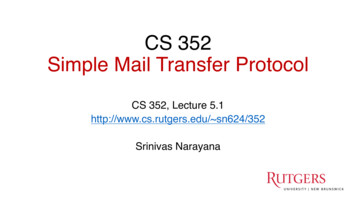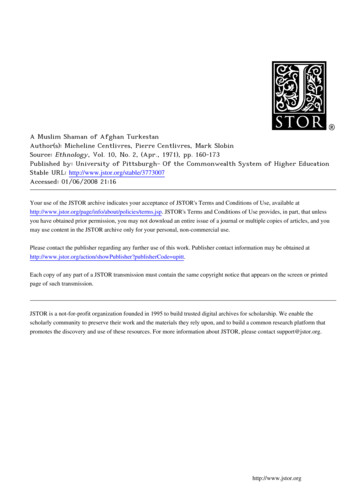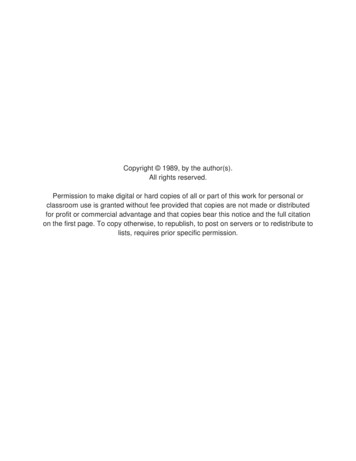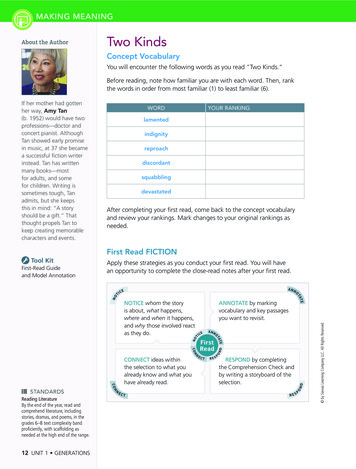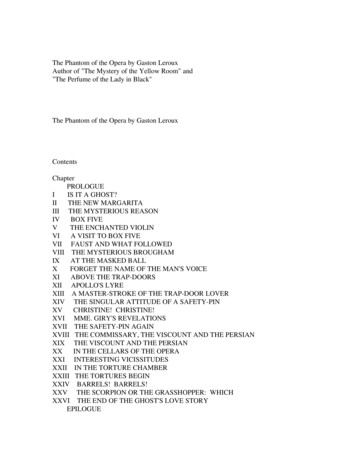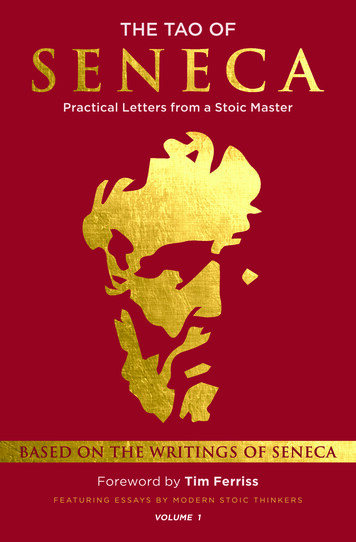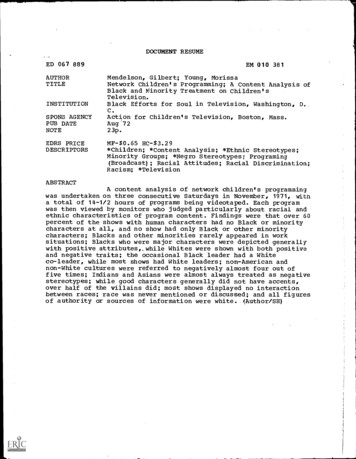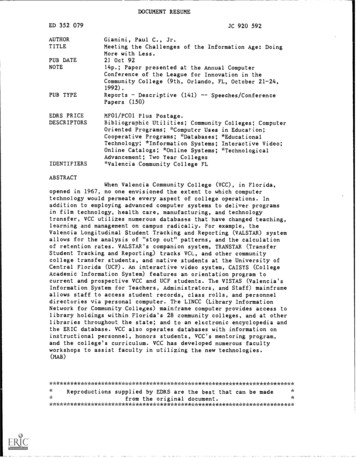
Transcription
DOCUMENT RESUMEED 352 079AUTHORTITLEPUB DATENOTEJC 920 592Gianini, Paul C., jr.Meeting the Challenges of the Information Age: DoingMore with Less.21 Oct 9214p.; Paper presented at the Annual ComputerConference of the League for Innovation in theCommunity College (9th, Orlando, FL, October 21-24,1992).PUB TYPEReportsDescriptive (141)Papers (150)EDRS PRICEDESCRIPTORSMFO1 /PCO1 Plus Postage.Bibliographic Utilities; Community Colleges; ComputerOriented Programs; *Computer Uses in Education;Cooperative Programs; *Databases; *EducationalTechnology; *Information Systems; Interactive Video;Online Catalogs; *Online Systems; ement; Two Year Colleges*Valencia Community College FLABSTRACTWhen Valencia Community College (VCC), in Florida,opened in 1967, no one envisioned the extent to which computertechnology would permeate every aspect of college operations. Inaddition to employing advanced computer systems to deliver programsin film technology, health care, manufacturing, and technologytransfer, VCC utilizes numerous databases that have changed teaching,learning and management on campus radically. For example, theValencia Longitudinal Student Tracking and Reporting (VALSTAR) systemallows for the analysis of "stop out" patterns, and the calculationof retention rates. VALSTAR's companion system, TRANSTAR (TransferStudent Tracking and Reporting) tracks VCC., and other communitycollege transfer students, and native students at the University ofCentral Florida (UCF). An interactive video system, CAISYS (CollegeAcademic Information System) features an orientation program tocurrent and prospective VCC and UCF students. The VISTAS (Valencia'sInformation System for Teachers, Administrators, and Staff) mainframeallows staff to access student records, class rolls, and personneldirectories via personal computer. The LINCC (Library InformationNetwork for Community Colleges) main:Erame computer provides access tolibrary holdings within Florida's 28 community colleges, and at otherlibraries throughout the state; and to an electronic encyclopedia andthe ERIC database. VCC also operates databases with information oninstructional personnel, honors students, VCC's mentoring program,and the college's curriculum. VCC has developed numerous facultyworkshops to assist faculty in utilizing the new ons supplied by EDRS are the best that can be madefrom the original ******************************
Meeting the Challenges of the Information Age:Doing More with LessPt:.ul C. Gianini,Jr.Conference of thePaper presented at the Annual ComputerintheCommunityCollegeLeague for InnovationOctober21-24,1992).(9th, Orlando, FL,U.S. DEPARTMENT OF EDUCATIONOffice of Educational Research and Improvement"PERMISSION TO REPRODUCE THISMATERIAL HAS BEEN GRANTED BYEDUCATIONAL RESOURCES INFORMATIONCENTER (ERIC)P. C. Gianini Jr.C This document has been reproduced asreceived from the person or Organization.)Originating itK\MInor changes have been made to improveeprodUCtion qualityPoints& view or opinions stated in this clocuTO THE EDUCATIONAL RESOURCESINFORMATION CENTER IERICImeet do not necessarily represent officialOERI position or policy--0 c2BEST COPY AVAILABLE
LEAGUE OF INNOVATION"Meeting the Challenges of the Information Age:Doing More with Less"October 21, 1992Good Evening. It is my pleasure to welcome you to Orlando. Thisconference, Content & Connection, will provide an opportunity for all of us todiscover new ways to infuse technology into other institutions. Over the nextgeneration, intelligent information technologies will eliminate every industrial-eraoccupation that centers on complex but routine processing of data. America isentering an era of smart machines working independently of people, and peopleworking in partnership with intelligent tools.The future of education will be radically changed by the emergence of aglobal market place and the growing challenge and opportunity of diversity.The evaluation of advanced technologies for teaching, learning andmanagement will develop new paradigms for education.Valencia Community College is committed to being in the forefrrt oftechnology and education.13
Valencia Community College has changed dramatically over the last 25years. When the college opened in 1967, no one envisioned the extent to whichcomputer technology would permeate every aspect of college operations. Backthen, payroll records were written by hand in a spiral-bound notebook bought atthe dime store.Today Valencia has become a "house" in the "global village." It isexchanging computer-based information with facilities statewide, nationally, andinternationally.Advanced technology enables a big college like Valencia tomaintain a personal touch. For instance, letters are automatically generated tostudents letting them know their academic progress at midterm.Valencia was the first community college in Florida to use a newcomputerized financial aid system. This system, now employed across the state,lets students learn almost instantly the amount of aid for which they qualify.With telephone registration, students can skip a trip to campus by registeringand paying for classes by telephone in less than four minutes.24
Valencia libraries have undergone nothing less than a computer revolution.Electronic reference databases have replaced old index-card catalogs. Studentshave electronic access to the holdings at UCF and the Orlando Public Library.Computer technology also takes Valencia to the forefront of one of thehottest issues in education:accountability.The new VALSTAR (ValenciaLongitudinal Student Tracking and Reporting) system tracks student progress andhelps answer the question: "How well are we doing?"VALSTARThe VALSTAR system is a computer-based longitudinal tracking systemdeveloped by the college to enable students to be tracked throughout their careerat Valencia. Students are followed semester-by-semester from their first term atthe college through graduation. The VALSTAR system provides for detailedanalysis cf which courses students "stop out" during the college career, andretentio i rates. VALSTAR research results play a central role in the college'sComprehensive Development Plan.3
TRANSTARThe TRANSTAR system is a companion to VALSTAR. and is beingdeveloped in cooperation with the University of Central Florida. TRANSTAR isa cohort-based longitudinal tracking system for Valencia's transfer students whoenter UCF.Since nearly 90% of Valencia's A.A. graduates attend UCF,TRANSTAR provides a very powerful tool to student performance of transferstudents in their upper diviskstudy, bachelor's degree graduation rates, transferretention rates, and course taking patterns. The system tracks Valencia transfersas well as UCF native students (those first time in college freshman who startedat UCF and continue into the upper division), and UCF other major feedercommunity colleges.CAISYSThe CAISYS (pronounced "cassie") system is an interactive video (IVD) -computer controlled system designed to provide information to current andprospective students about Valencia and the University of Central Florida. Thesystem was developed as part of a 2.5 million federal cooperation grant toValencia and UCF. Valencia staff are currently pilot testing the system which willeventually be placed on both the Valencia and UCF campuses, as well as all high4
schools in Orange and Osceola counties.CAISYS combines text, computergraphics, video and sound to produce an extremely user friendly informationaccess system that only requires the user to touch the screen to get appropriateinformation. The system may be thought of as an "orientation system in a box."VISTASVISTAS is a mainframe access system that utilizes the existing telephonesystem and a personal computer on a professor's desk to provide access to awealth of information. Professors and staff can directly k. 4:.ess student records,class rolls, personnel directory and other information from their own offices. Thesystem is especially useful during student advisement, since a student's past coursetaking performance is only a few key strokes away.LINCCLINCC is the new Florida community system library catalog access system.Run from a mainframe computer, the system links all 28 of Florida's communitycollege libraries to create a state-of-the-art electronic card catalog system.LINCCnot only locates titles quickly and easily, but tells the student on which campus thebook is located. When a book is not located at Valencia, LINCC tells where else5
it may be in the state, including the entire state university system as well as otherstate community colleges. More than just a card catalog, LINCC also providesaccess to an electronic encyclopedia and the ERIC data base.CURRICULUM DATABASEValencia's curriculum database contAins all courses and course descriptionsas well as review status, pre- and co-requisites. The database make revisions ofthe college catalog much more quickly and painlessly than the old paper-basedsystem. The database is updated after each curriculum change and is thus alwayscurrent and available to provide the latest course information even though thecollege catalog becomes outdated well before it is replaced by the next edition.INSTRUCTIONAL PERSONNEL DATABASEThe instructional personnel database contains credentialing information forall faculty, full- and part-time who teach at the college. Reports available fromthis database each term ensure that properly credentialed faculty are assigned tothe current courses.The system can combine data from other institutionaldatabases, including the master schedule of courses and the payroll database toprovide custom reports for use by department chairs and others, as needed.68
HONORS STUDENT DATABASEValencia's nationally recognized Honors Program maintains an extensivedatabase on all Honors students. The database contains detailed information of700 or so honors students each term, and enables efficient monitoring of studentprogress toward an honors degree or certificate.MENTORDTG DATABASEValencia's mentoring program for high-risk students has led to a dramaticimprovement in retention rates for those students in the program The databasematches potential faculty mentors with prospective students.ELECTRONF: TRANSCRIPTSValencia developed the capacity to sent and receive transcripts via electronictransmission through the Florida Information Resource Network.Electronictranscripts greatly increase the speed and transcript transmission and evaluation.UCF-VALENCIA LINKAGEA unique linkage of the Valencia and the UCF student databases has beendeveloped that enable appropriate faculty and staff to actually pull up studentrecords from the neighboring institution. This greatly increases the accuracy and79
case of advising transfer and/or transient students.INSTRUCTIONAL COMPUTINGValencia maintains extensive instructional computing capability on thecampuses. These facilities include provisions for student use of IBM-compatibleand Macintosh computers, local area networks, desktop publishing, CAD, and ahighly successful computer training program for disabled individuals.FACULTY TRAININGNumerous faculty workshops have been developed and offered to assistValencia faculty in effectively utilizing technologies to improve their ability toteach a wide variety of topics to their students. These programs have 1,:.cLided a"Technology Fair" for all faculty during the fall opening day's activities,workshops for students and faculty in utilizing the various computer-baseddatabases housed in the learning resource centers, and small group training inutilizing technologies like graphing calculators and projects.Individualizedtraining has been provided in utilizing the VISTAS data as well as group sessionson using network-based software to assist in the teaching of composition.810
ENTERTAINMENTIn 1989 Valencia established The Institute for Entertainment Technologies.Joining an already established theater entertainment technology program, Valenciainaugurated the film production technology program with assistance from bothDisney/MGM and Universal Studios. Currently Valencia Community Collegestudents are employed as technicians in major areas of film production.HEALTH CAREValencia has joined with ORMC and developed five imaging programs totrain medical personnel in the latest imaging technology.SOLAR Student On-Line Advisement and Articulation SystemSOLAR, a Student On-Line Advisement and Articulation System, wasdeveloped as a part of The Florida Career Information Delivery System FCIDS bythe State Board of Community Colleges. The SOLAR file contains informationdetailing the requirements a student must consider when planning to transfer froma community colleges to a state university.As of 1992 the data from the on-line Florida Resource Information Network
(FERN) is available to all state universities and community colleges throughMICRO-SOLAR.MICRO-SOLAR, an IBM PC version is easily accessible and user friendly.Students, along with counselors and faculty, can readily obtain requirementsnecessary to consider when planning to transfer from a community college to astate university. The information includes classes to be taken at the communitycollege and applied toward graduation from the university.The communitycollege enters equivalent prerequisite courses required for a particular major. Theuniversity then checks the data and codes it so that a student can immediatelydetermine if the course is required or recommended for admission to a particularmajor.In addition to specific majors, ALL university counseling manuals are in MICRO-SOLAr and all information is updated yearly.MANUFACTURINGValencia serves as the lead institution for Central Florida's ManufacturingTechnology Transfer Center. Florida's manufacturers need help now more than
ever as defense contracts are reduced.Many of the smaller companies in the defense supplier base are reorganizingto seek commercial business and are emerging as world-class competitors inFlorida's growing manufacturing export community. They are updating theirmanufacturing processes using world-class quality standards; installing new designcapabilities for rapid prototyping and product development; and installingelectronic data interchange capabilities to enable them to network with the largercompanies as preferred suppliers.These concepts, along with Computer Integrated Manufacturing, are taughtin Valencia's "teaching factory," which emphasizes the need for strong academicskills as well as technical job skills that can be demonstrated by our students totheir prospective employers.In 1990 our Computer Integrated CollegeManufacturing program won the U.S. Secretary of Education award for the mostoutstanding technical training program in the Southwest.Valencia's technology transfer team also works with manufacturers to helpthem incorporate state-of-the-art methods into manufacturing. These technologytransfer and on-site training activities contribute to economic development within
our region. As you will appreciate, the application of new technologies in industryrequires the education and training of the workforce to achieve true manufacturingproductivity gains.
The TRANSTAR system is a companion to VALSTAR. and is being developed in cooperation with the University of Central Florida. TRANSTAR is a cohort-based longitudinal tracking system for Valencia'stransfer students who enter UCF.
